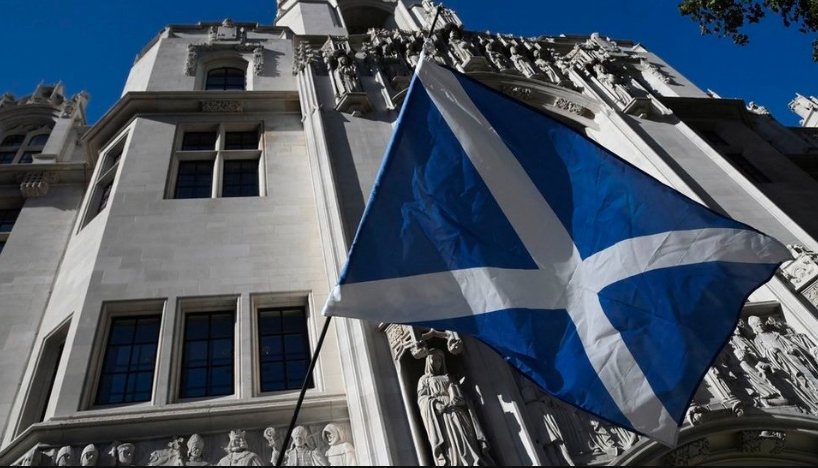The Alba party publishes legal advice on the Supreme Court ruling
The Alba party has published an extract from legal advice that questions the Supreme Court’s decision to block Holyrood from holding an independence referendum without the UK government’s consent. The advice, written by a senior constitutional lawyer, argues that the court engaged in “judicial overreach” and “judicial activism” by interfering in a political matter that should be resolved by democratic means.
The legal advice was commissioned by the Alba party, which supports Scottish independence and is led by former First Minister Alex Salmond. The party claims that the advice supports its position that the Scottish Parliament has the right to hold an advisory referendum on independence, and that the UK government should respect the will of the Scottish people.
The advice also suggests that the Supreme Court ruling could have implications for other devolved matters, such as health, education and the environment, and that it could undermine the principle of parliamentary sovereignty.
The Supreme Court ruling on indyref2
The Supreme Court ruled unanimously on November 23, 2023, that the Scottish government does not have the power to hold an independence referendum without the UK government’s consent. The court said that the issue of the union is reserved to Westminster, and that the draft independence referendum bill drawn up by the Scottish government would “relate to” a reserved matter.

The court rejected the argument that the referendum would be advisory and have no legal consequences, and said that it was clear that the Scottish government’s intention was to use the referendum as a basis for negotiations and legislation on independence. The court also said that the referendum would have a significant impact on the constitutional arrangements of the UK, and that it would be incompatible with the principle of mutual respect and cooperation between the UK and Scottish governments.
The ruling was a blow to First Minister Nicola Sturgeon, who wants to hold a referendum on October 19, 2023, with the support of the SNP and the Scottish Greens, who form a pro-independence majority in the Scottish Parliament. Sturgeon has repeatedly called on the UK government to agree to a deal similar to the one ahead of the 2014 referendum, which would ensure the legitimacy and recognition of the result. However, the UK government has refused to do so, and has said that the 2014 referendum was a “once in a generation” event.
The reaction to the Supreme Court ruling
The Supreme Court ruling has sparked a heated debate among politicians, lawyers and academics on the constitutional status of Scotland and the future of the union. The Scottish government has expressed its disappointment and frustration with the ruling, and has said that it will continue to pursue its democratic mandate for a referendum. Sturgeon has said that the ruling does not change the fact that the people of Scotland have the right to decide their own future, and that the UK government cannot deny that right indefinitely.
The UK government has welcomed the ruling, and has said that it confirms its position that the union is a matter for the whole of the UK, and that any change to it requires the consent of all parts of the UK. Prime Minister Boris Johnson has said that the ruling shows that the Scottish government should focus on the recovery from the Covid-19 pandemic, and that the UK is stronger together as one family of nations.
The Alba party has criticised the ruling, and has said that it exposes the flaws of the devolution settlement and the lack of respect for the Scottish Parliament. The party has said that the ruling is a “constitutional outrage” and a “democratic disgrace”, and that it will campaign for a “legal and constitutional challenge” to the UK government’s position. The party has also said that it will seek to mobilise public opinion and civil society in favour of independence, and that it will support any peaceful and democratic actions to achieve that goal.
The implications of the Supreme Court ruling
The Supreme Court ruling has raised a number of questions and challenges for the future of the constitutional debate in Scotland and the UK. Some of the issues that have been discussed include:
- The role and legitimacy of the Supreme Court as the final arbiter of constitutional disputes between the UK and Scottish governments, and the extent to which it can intervene in political matters that affect the union.
- The status and scope of the devolution settlement, and the balance of powers and responsibilities between Westminster and Holyrood, especially on matters that are not explicitly reserved or devolved.
- The principle and practice of parliamentary sovereignty, and the relationship between the UK Parliament and the Scottish Parliament, and whether the latter can be overruled or abolished by the former.
- The possibility and feasibility of holding an independence referendum without the UK government’s consent, and the legal and political consequences of such a scenario, both domestically and internationally.
- The prospects and options for a negotiated settlement between the UK and Scottish governments on the issue of independence, and the role and influence of other actors, such as the EU, the UN and the Commonwealth.
- The public opinion and sentiment in Scotland and the rest of the UK on the issue of independence, and the factors and events that could affect or change it.
The Supreme Court ruling has not resolved the constitutional debate in Scotland and the UK, but rather has intensified and complicated it. The ruling has also highlighted the need for a dialogue and a consensus on the future of the union, and the role and rights of the people of Scotland within it.


















